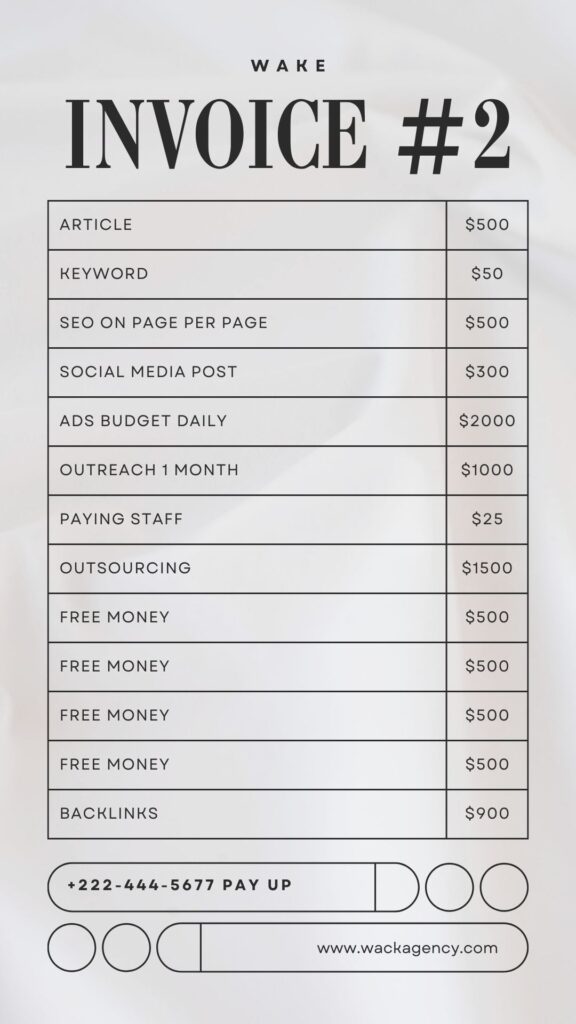ℹ 32-Minute Read – Don’t miss the quiz at the end!
I want to start by sharing a personal story that opened my eyes to the hidden practices of some marketing agencies. A few years ago, I hired a well-known SEO agency for my e-commerce business. I was excited about the potential growth and expected them to bring some serious value to my brand. The agency charged me $2,500 a month, which was a significant investment for my business, but I believed their expertise would be worth every penny.
For the three months I worked with them, I kept waiting to see results. They promised me improved search rankings, increased traffic, and better online visibility. But instead of the comprehensive SEO strategy I was expecting, all they did was link my site on a few of their existing clients’ websites. They called this a “$2,000 backlink,” claiming it would work wonders for my SEO. When I realized what they were doing, I was furious. I was paying a hefty fee every month, only to find out that their strategy was nothing more than linking my site in places that didn’t make sense or drive any real value.
That experience was a wake-up call for me. I realized that some agencies were more interested in padding their profits than providing real value to their clients. I decided to take matters into my own hands. Now, I run my own solo agency, where I do things differently. I believe in being transparent with my clients and delivering genuine, tangible results (not selling you anything just finish the article). Having been on the other side, I want to expose these agencies and reveal the 10 secrets that they’re hiding from you. It’s time to lift the curtain and show you what really goes on behind the scenes.
Secret #1: The Illusion of Premium Backlinks
Explanation: One of the biggest secrets in the SEO world is how some agencies sell the concept of “premium backlinks.” These agencies often claim that they have special relationships or insider access to high-authority websites and that these connections allow them to secure valuable backlinks for your site. They’ll tout these backlinks as essential for boosting your SEO, sometimes pricing them at thousands of dollars each.

However, what they don’t tell you is that these so-called “premium backlinks” are often nothing more than simple links placed on their other clients’ websites or even low-quality directories. Instead of truly building your site’s authority through meaningful partnerships and content, they’re essentially just moving links around within their own network. This practice not only provides minimal SEO value but can also harm your website if these links are considered unnatural by search engines.
Example: In my own experience with a well-known SEO agency, they charged me $2,500 per month, claiming part of this fee was for securing a “$2,000 backlink.” When I investigated further, I discovered that the backlink was simply a link placed on another one of their clients’ sites — a practice that felt more like a shady deal than a genuine SEO strategy. The agency portrayed this as an exclusive advantage, but in reality, it was a basic link swap that anyone could do for free.
How to Detect These Sneaky Practices:
Ask for Transparency: Whenever an agency mentions backlinks, ask them to explain exactly how they plan to secure them. Legitimate SEO efforts involve outreach to relevant sites, guest posting, and content creation — not just placing links wherever they can.
Request Examples: Ask for examples of backlinks they’ve secured for other clients, including the URL of the linking page. This allows you to see the quality and relevance of the sites where these backlinks are being placed.
Check for Red Flags: Be wary of agencies that promise quick and easy backlinks without any mention of creating high-quality content or building genuine relationships. True link-building takes time and effort; if it sounds too good to be true, it probably is.
(Important) Monitor Your Backlink Profile: Use tools like Ahrefs, SEMrush, or Moz to keep an eye on your backlink profile. If you notice links from low-quality sites or a sudden influx of backlinks that don’t seem natural, it’s worth digging deeper into what the agency is doing.

Secret #2: Outsourcing to Cheap Labor
Another well known secret that many marketing agencies don’t want you to know is that a significant portion of the work they charge premium rates for is actually outsourced to cheap labor (Sorry India, Pakistan, but it’s true). While they may present themselves as a full-service agency with a team of in-house experts, the reality is often quite different. Many agencies outsource tasks such as content creation, social media management, and even technical SEO to freelancers or overseas workers who charge a fraction of what the agency charges you.
This practice allows agencies to maximize their profits, but it can also mean that the quality of work suffers. When the focus is on cutting costs rather than delivering value, the results can be poorly written content, ineffective SEO strategies, and generic social media posts that don’t align with your brand’s voice or goals.
Real Life Example:
I’ve seen this firsthand when I worked with another agency for my e-commerce business. They promised high-quality content and comprehensive SEO strategies, but the results were far from what was advertised. The articles were filled with grammatical errors and irrelevant information that didn’t resonate with my audience. When I dug a little deeper, I discovered that the content was being written by freelancers in different countries (that was before the age of AI thankfully), often for just a few dollars per article. The agency, however, was charging me hundreds of dollars for each piece of content.
How to Detect These Sneaky Practices:
Ask About Their Team: Don’t be afraid to ask specific questions about who will be working on your account. Ask for names, roles, and even bios of the team members. A reputable agency should be transparent about their staff and their qualifications.
Request Samples (it’s standard): Ask for samples of work that are directly relevant to what they will be doing for you. Look for consistency in quality, tone, and attention to detail. If you see a wide variance in creativity, it could be a sign that the work is being outsourced.
Analyze Communication: Pay attention to how the agency communicates with you. If there are frequent delays or if you’re only getting responses during odd hours, it might indicate that they’re working with teams in different time zones.
Monitor Quality: Continuously evaluate the quality of the work you receive. If you notice a drop in quality or work that seems generic or off-brand, it’s worth investigating whether the agency is outsourcing without your knowledge. This is you business, you should always keep an eye on your inputs / outputs.
Secret #3: Charging for Unnecessary Services
One of the most frustrating tactics that marketing agencies often do is charging for services you don’t actually need (It’s like asking a mechanic to fix your car’s radio and coming back to find your engine replaced). These agencies create the illusion that every single service they offer is essential for your success, even when it’s not. They bundle unnecessary services into your package or upsell you on things that sound impressive but have little to no impact on your business.
For example, an agency might convince you that you need extensive keyword research every single month or that you should be running multiple, costly ad campaigns simultaneously. They make it sound like these services are crucial for your growth, but in reality, they might be doing very little to move the needle for your specific goals. By pushing these unnecessary services, they inflate their invoices, ensuring that you’re paying far more than you need to for marginal gains.

Example:
When I first started out, I worked with an agency that insisted I needed a comprehensive SEO audit every month, charging me a hefty fee each time. They claimed it was necessary to stay on top of algorithm changes and competitors. However, after a few months, I realized that the reports were nearly identical, with no new insights or actionable items. It was clear they were just recycling the same information and charging me for it repeatedly. This unnecessary service was a waste of both time and money, and I felt duped into paying for something that had little real benefit for my business.
How to Detect These Sneaky Practices:
Ask for Justification: Whenever an agency recommends a service, ask them to explain why it’s necessary and how it aligns with your specific goals. A reputable agency should be able to clearly articulate the value of each service and provide evidence of its effectiveness.
Request Customized Plans: Be wary of agencies that only offer rigid, pre-set packages. A good agency should be flexible and willing to customize their services based on your unique needs and budget.
Do Your Research: Before agreeing to any new service, do some independent research or get second opinions without telling the other party what you are intending to do in order to understand if it’s really needed for your business. This will help you determine if the service is genuinely beneficial or just another upsell tactic.
Monitor Performance: Keep a close eye on the performance and impact of each service. If you’re paying for something, make sure it’s contributing to your business goals. If not, it’s time to have a serious conversation with your agency about cutting it from your plan.

Secret #4: Using Generic Strategies for Every Client
Another common secret that many marketing agencies hide is their tendency to use generic, one-size-fits-all strategies for every client. Rather than taking the time to understand your unique business needs, industry nuances, and target audience, these agencies apply the same template or strategy across all their clients. This cookie-cutter approach may work for some businesses, but it often fails to deliver optimal results because it lacks personalization and fails to address the specific challenges and opportunities of your market.
Agencies may pitch these strategies as “proven” or “tried-and-true,” but in reality, they’re just recycling the same tactics without considering whether they’re actually the best fit for your business. This approach can result in campaigns that don’t resonate with your audience, ineffective ad placements, and a lack of meaningful engagement, ultimately wasting your marketing budget.
Example:
In my experience, I once partnered with an agency that assured me they had a formula for success in my industry. However, what they provided was a standard marketing plan they had clearly used for other clients, with minimal adjustments. The social media posts were generic, the ad copy felt uninspired, and there was no distinct strategy for targeting my specific customer base. I quickly realized that they weren’t interested in tailoring their approach to my brand but were simply going through the motions with a pre-packaged strategy.
How to Detect These Sneaky Practices:
Ask for Customization: When an agency presents a strategy or plan, ask how it has been customized to fit your specific business needs and goals. A good agency should be able to demonstrate that they’ve put thought into a unique approach just for you.
Look for Specificity: Be wary of vague language and broad statements. Effective strategies should be specific to your industry, audience, and objectives. If everything sounds generic or could apply to any business, that’s a red flag.
Review Case Studies: Request case studies or examples of past work that show how they have successfully customized strategies for other clients. This will give you a better idea of their ability to adapt and tailor their services.
Demand a Discovery Process: A reputable agency will conduct a thorough discovery process before proposing a strategy. This process should include a deep dive into your business, competitive landscape, and target market. If they skip this step or don’t ask detailed questions, it’s a sign they might be using a cookie-cutter approach.
Secret #5: Inflating Metrics to Impress Clients
One of the more deceptive practices some marketing agencies engage in is inflating metrics to make their performance appear better than it actually is. They know that many clients may not be well-versed in the technicalities of digital marketing metrics, so they manipulate or selectively present data to create an illusion of success.

Common inflated metrics include impressions, clicks, and social media followers. While these numbers might look impressive on the surface, they don’t always translate to meaningful business outcomes like sales, conversions, or customer loyalty. An agency might boast about a significant increase in website traffic, but if that traffic isn’t relevant or doesn’t lead to any tangible results, it’s essentially worthless. They might also use vague terms like “engagement” without clearly defining what that means, or they may highlight vanity metrics that look good but don’t necessarily indicate progress towards your business goals.
Example:
I remember working with an agency that would send me monthly reports filled with graphs and numbers showing massive spikes in website traffic. On paper, it looked like they were doing a fantastic job. However, when I dug deeper, I realized that most of this traffic was coming from irrelevant sources and wasn’t converting into sales. They were also counting every minor interaction on social media as “engagement,” inflating the numbers to make it seem like the campaign was more successful than it actually was.
How to Detect These Sneaky Practices:
Focus on Meaningful Metrics: Instead of getting caught up in vanity metrics like impressions or clicks, ask the agency to focus on key performance indicators (KPIs) that align with your business goals, such as conversion rates, lead generation, or return on investment (ROI).
Request Transparent Reporting: Ask the agency to provide detailed reports that break down the metrics they are tracking. Look for clear explanations of what each metric means, where the data comes from, and how it ties back to your objectives.
Ask for Context: Numbers without context can be misleading. When an agency presents data, ask them to explain what the numbers mean in terms of actual business impact. Are those website visitors converting into customers? Is the engagement leading to more sales or brand awareness?
Cross-Check with Analytics: Use your own analytics tools, such as Google Analytics, to verify the data the agency provides. This will help you making sure the numbers align and aren’t being manipulated or selectively reported to give a skewed view of performance.

Secret #6: False Portfolios and Testimonials
Another secret that some marketing agencies keep hidden is the use of false portfolios and testimonials to lure in new clients. These agencies know that showcasing impressive case studies and glowing reviews can quickly build trust and credibility. To capitalize on this, they might exaggerate their achievements or, in some cases, outright fabricate their success stories.
Some agencies go as far as displaying portfolios of projects they didn’t actually work on or significantly inflating the results of the projects they did handle. They might also create fake testimonials by writing them themselves or getting friends and family to pose as satisfied clients. This practice is not only unethical but also misleading, as it can make you believe that the agency has more experience and success than it truly does.
Example:
I encountered this issue when I was exploring agencies for my own business. One agency showcased a portfolio filled with high-profile clients and projects. However, when I reached out to some of these companies for references, I found out that the agency had exaggerated their involvement or, in some cases, never worked with them at all. Similarly, some glowing testimonials on their website didn’t match the feedback I received directly from the supposed clients. This experience taught me to dig deeper and verify claims before trusting an agency with my business.
How to Detect These Sneaky Practices:
Verify Case Studies: If an agency presents impressive case studies, ask for specifics. Request details about the campaign, the results, and the client’s contact information for verification. Reputable agencies should have no problem providing references that you can speak to directly.
Check Authenticity: Do some detective work on the testimonials. Look up the people who are giving reviews to see if they actually exist and have a legitimate association with the agency. You can also check LinkedIn or other professional networks to validate their identities and affiliations.
Ask for Direct Contact: Don’t be afraid to ask the agency to connect you with past or current clients. Speaking to these clients will give you a clearer picture of the agency’s capabilities and whether their claims hold up under scrutiny.
Look for Consistency: Genuine portfolios and testimonials will be consistent across different platforms. Check the agency’s website, social media profiles, and third-party review sites to see if their stories align. Inconsistencies could indicate that some of the information is fabricated or exaggerated.

Secret #7: Overcharging for Basic Services
One of the more frustrating secrets of some marketing agencies is their tendency to overcharge for basic services. These agencies might offer standard services such as social media management, SEO, or content creation at inflated rates, disguising them as premium or exclusive offerings. They often bundle these basic services into high-priced packages or present them as high-value services to justify their steep fees.
The reality is that many of these services are not unique or special; they are standard industry practices that should be reasonably priced. By charging excessively for these basic services, agencies maximize their profits while providing little added value. This can leave clients feeling like they’re not getting their money’s worth, as the services delivered don’t align with the high price tag.
Example:
In my early days, I worked with an agency that charged me a premium for “exclusive” social media management. They marketed it as a high-touch, bespoke service, but when I examined the details, it turned out to be basic scheduling and posting that I could have easily managed with a simple tool or a less expensive service. The cost was disproportionately high for the level of service provided, which left me feeling that I was being overcharged for something quite ordinary.
How to Detect These Sneaky Practices:
Break Down the Costs: Request a detailed breakdown of what’s included in the service and the associated costs. Compare this breakdown to industry standards and similar offerings from other agencies or service providers.
Research Market Rates: Do some research on average pricing for the services being offered. This will give you a benchmark to determine if the agency’s rates are reasonable or excessively high.
Evaluate Service Deliverables: Assess the actual deliverables you receive. If you’re being charged a premium but the deliverables are standard and don’t offer any unique or additional value, it might be a sign of overcharging.
Ask for Alternatives: Request alternative options or packages that provide similar services at a lower cost. This can help you gauge whether the agency’s pricing is inflated or if they genuinely offer something extra.
Seek Independent Opinions: Consult with industry experts or peers to get their opinions on the pricing and value of the services being offered. They may provide insights into whether the costs are justified or if you’re being overcharged.
Secret #8: Hiding Behind Technical Jargon
A common tactic used by some marketing agencies is hiding behind technical jargon to obscure their actual performance and tactics. Agencies may use complex terminology, buzzwords, and industry-specific language to make their strategies and processes seem more advanced or sophisticated than they really are. This jargon can create a barrier between you and the work being done, making it difficult to understand what’s actually happening and assess whether the agency is delivering on their promises.

For example, terms like “algorithm optimization,” “content syndication,” or “advanced attribution modeling” might sound impressive, but if they’re not explained clearly or if the results are not measurable, they can be misleading. This tactic allows agencies to avoid scrutiny and keep clients in the dark about whether their strategies are effective or if they’re just paying for fluff.
Example:
I once worked with an agency that frequently used buzzwords like “synergistic approach” and “dynamic keyword integration” in their reports. At first, I was impressed by the sophisticated terminology. However, when I asked for plain-language explanations and tangible results, I found that the agency was using these terms to describe very basic practices that didn’t justify the high costs. The impressive-sounding language was just a smokescreen to cover up a lack of real strategy and results.
How to Detect These Sneaky Practices:
Ask for Simplified Explanations: Whenever you encounter technical jargon, request a straightforward explanation in plain language. A reputable agency should be able to explain their strategies and tactics without relying on complex terminology.
Focus on Results: Rather than getting caught up in the language, focus on the results and outcomes. Ask for clear, measurable metrics that show how their strategies are impacting your business goals.
Request Transparency: Insist on transparency about the processes and methods being used. A good agency should be able to walk you through their approach in a way that makes sense and shows how it will benefit your business.
Educate Yourself: Take some time to familiarize yourself with basic marketing concepts and terminology. This will help you better understand what agencies are talking about and make it easier to identify when they’re using jargon to obscure their true practices.
Seek Third-Party Opinions: Consult with an independent expert or advisor who can help you interpret the technical information and assess whether the agency’s claims are legitimate.

Secret #9: Overpromising Results
One of the most deceptive practices among some marketing agencies is overpromising results to secure clients. These agencies make grand claims about achieving specific, often unrealistic, outcomes such as guaranteed top rankings on search engines, a substantial increase in sales, or rapid growth in social media followers. They use these promises to lure you in, knowing that such results are often beyond their control and depend on numerous factors outside their influence.
While it’s natural for agencies to be optimistic about their capabilities, overpromising can lead to disappointment and dissatisfaction when the results don’t match expectations. These agencies might use persuasive language to make their services sound like a surefire way to success, but in reality, many factors contribute to marketing outcomes, and no agency can guarantee specific results.
Example:
I once engaged with an agency on those freelance websites that promised to get my e-commerce site to the top of Google search results within a month. They assured me that their “proprietary techniques” would deliver results quickly and significantly boost my sales. After several months and no significant improvement, I realized that their promises were unrealistic. They had used these grand claims to secure the contract, but they couldn’t deliver on their exaggerated promises.
How to Detect These Sneaky Practices:
Request Realistic Goals: Ask the agency to set realistic and measurable goals based on your current position and market conditions. Avoid agencies that promise guaranteed results or specific outcomes within an unrealistic timeframe.
Seek Evidence of Past Performance: Look for evidence of how the agency has handled similar projects in the past. Request case studies and references from clients who had similar goals. This will give you a clearer picture of what you can expect.
Understand the Process: Get the agency to explain their approach and how it will contribute to achieving your goals. A well-defined process and clear strategy are more valuable than grandiose promises.
Check for Transparency: Be cautious of agencies that avoid discussing potential challenges or limitations. A reputable agency should be transparent about what’s feasible and acknowledge that results may vary.
Watch for High-Pressure Sales Tactics: Be wary of agencies that use high-pressure tactics to close deals quickly or push you to sign contracts without proper evaluation. Genuine agencies will give you time to review their proposals and discuss realistic expectations.
Secret #10: Lack of Accountability and Poor Communication
One of the most frustrating secrets that some marketing agencies keep is their lack of accountability and poor communication practices. These agencies often fail to provide regular updates, don’t clearly communicate their strategies, and are quick to deflect blame if things don’t go as planned. This lack of accountability can leave you feeling disconnected and uncertain about the value you’re getting from their services.

Agencies that practice poor communication might not provide detailed reports or be transparent about the work being done. They might also be slow to respond to inquiries or provide vague explanations when you ask for updates. This can make it difficult to assess the effectiveness of their strategies and hold them accountable for their performance.
Example:
I had an experience with an agency that was very responsive when it came to the initial pitch but became increasingly difficult to reach once the contract was signed. They provided sparse reports and would often miss deadlines for updates. When I asked for clarification on certain aspects of their work or requested performance metrics, their responses were either delayed or unsatisfactory. This lack of accountability made it challenging to understand what was being done and whether it was meeting my expectations.
How to Detect These Sneaky Practices:
Establish Communication Expectations: Before signing a contract, set clear expectations for communication, including how often you’ll receive updates, the format of reports, and the process for addressing concerns. A reputable agency should have these as standard and included in their offers.
Request Regular Reports: Insist on receiving regular, detailed reports that outline the work completed, the results achieved, and any adjustments made to the strategy. These reports should be comprehensive and easy to understand.
Assess Responsiveness: Pay attention to how promptly and effectively the agency responds to your inquiries. Poor communication and delays in response times can be indicators of future issues.
Demand Accountability: Make sure the agency takes responsibility for their work and is willing to address any issues or shortcomings. They should be open to discussing what’s not working and making necessary adjustments.
Look for Clear Processes: A good agency will have clear processes in place for managing projects and communicating with clients. Ask about their workflow, how they handle changes or issues, and how they ensure that client expectations are met.
What I’d Do If I’m Looking for an Agency for My Business

1. Define My Goals and Expectations:
First, I’d clearly outline what I want to achieve with my marketing efforts. Whether it’s boosting sales, increasing brand awareness, or improving online visibility, having specific goals will help me find an agency that fits my needs.

2. Conduct Thorough Research:
I’d look for agencies with a solid track record in my industry. I’d check their client list, review their case studies, and look at their performance results. I’d also read reviews and testimonials from previous clients to get a sense of their reputation.

3. Evaluate Their Expertise:
I’d make sure the agency has relevant experience and knowledge in the services I need. Whether it’s SEO, social media marketing, content creation, or PPC, the agency should have a strong background and proven success in those areas.

4. Ask for References:
I’d request references from current or past clients and contact them for feedback. I’d ask about their experience with the agency, the results they achieved, and how the agency managed any issues.

5. Review Their Approach and Process:
I’d want to understand the agency’s approach and their process for managing projects. They should provide a clear strategy and explain how they plan to meet my goals. I’d avoid agencies that offer vague or generic plans.

6. Assess Communication and Transparency:
I’d choose an agency that communicates effectively and is transparent. They should provide regular updates, be clear about their methods, and respond to my inquiries promptly.

7. Check for Certifications and Awards:
I’d look for any industry certifications, awards, or recognitions that validate the agency’s credibility and expertise. These can be good indicators of their commitment to high standards and best practices.

8. Compare Proposals and Pricing:
I’d gather detailed proposals from several agencies and compare their services, pricing, and overall value. I’d make sure there are no hidden fees and that the pricing matches the services offered.

10. Trust My Instincts:
I’d trust my instincts when selecting an agency. If something feels off or if I have concerns about their transparency or integrity, I’d be prepared to look elsewhere.

10. Check My Budget:
Before engaging with an agency, I’d set a clear budget for my marketing efforts. I’d make certain the agency’s pricing fits within my budget and communicate my financial constraints clearly. They should be able to offer options or packages that align with what I’m willing to spend without compromising on service quality.

11. Consider a Trial Period:
If possible, I’d negotiate a trial period or a smaller project to test the agency’s performance before committing to a long-term contract. This would allow me to evaluate their work and see if they’re a good fit for my business.
Conclusion
Finding the right marketing agency is crucial for your business’s success. From my own experiences, I’ve learned that it’s essential to partner with an agency that truly values your goals and is committed to achieving them. By being aware of the secrets some agencies might keep and following the tips I’ve shared, you’ll be better prepared to find a partner that genuinely cares about your success.
When you’re looking for an agency, focus on those that communicate openly, set realistic expectations, and align with your budget and goals. A great agency isn’t just about delivering results; it’s about being a true partner in your journey, working hard to enhance your online presence and contribute to your growth.
Remember, the best agencies are those that don’t just see you as a client but as a valued partner. They should be passionate about helping you succeed and dedicated to making a real difference for your business.
As you embark on this search, I encourage you to seek out agencies that embody these qualities. With the right agency by your side, you’ll be well on your way to reaching new heights and achieving your marketing goals.
Thanks for reading, and here’s to finding an agency that will work alongside you with integrity and enthusiasm. Best of luck in your search—I’m confident you’ll find the perfect partner to help your business thrive.
Test Your Knowledge: Marketing Agency Secrets
Take your time and quiz yourself to see what you’ve learned from the article. Good luck!
Follow My Company on Linkedin: DropContractor Agency



